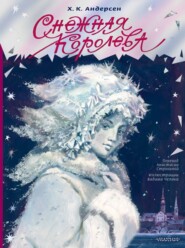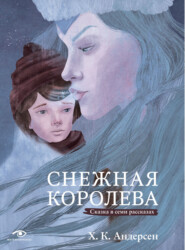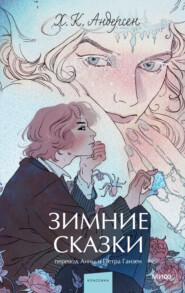По всем вопросам обращайтесь на: info@litportal.ru
(©) 2003-2024.
✖
What the Moon Saw: and Other Tales
Настройки чтения
Размер шрифта
Высота строк
Поля
"Well, and what have you done? what have you accomplished down there?"
"I have really accomplished nothing at all in the world: nothing that I can plead to have the doors here opened to me. It would be a real mercy to allow me to slip in through the gate."
"In what manner did you leave the world?" asked he, just for the sake of saying something; for it was wearisome work standing there and saying nothing.
"Why, I really don't know how I left it. I was sick and miserable during my last years, and could not well bear creeping out of bed, and going out suddenly into the frost and cold. It was a hard winter, but I have got out of it all now. For a few days the weather was quite calm, but very cold, as your honour must very well know. The sea was covered with ice as far as one could look. All the people from the town walked out upon the ice, and I think they said there was a dance there, and skating. There was beautiful music and a great feast there too; the sound came into my poor little room, where I lay ill. And it was towards the evening; the moon had risen beautifully, but was not yet in its full splendour; I looked from my bed out over the wide sea, and far off, just where the sea and sky join, a strange white cloud came up. I lay looking at the cloud, and I saw a little black spot in the middle of it, that grew larger and larger; and now I knew what it meant, for I am old and experienced, though this token is not often seen. I knew it, and a shuddering came upon me. Twice in my life I have seen the same thing; and I knew there would be an awful tempest, and a spring flood, which would overwhelm the poor people who were now drinking and dancing and rejoicing – young and old, the whole city had issued forth – who was to warn them, if no one saw what was coming yonder, or knew, as I did, what it meant? I was dreadfully alarmed, and felt more lively than I had done for a long time. I crept out of bed, and got to the window, but could not crawl farther, I was so exhausted. But I managed to open the window. I saw the people outside running and jumping about on the ice; I could see the beautiful flags that waved in the wind. I heard the boys shouting 'hurrah!' and the servant men and maids singing. There were all kinds of merriment going on. But the white cloud with the black spot! I cried out as loud as I could, but no one heard me; I was too far from the people. Soon the storm would burst, and the ice would break, and all who were upon it would be lost without remedy. They could not hear me, and I could not come out to them. Oh, if I could only bring them ashore! Then kind Heaven inspired me with the thought of setting fire to my bed, and rather to let the house burn down, than that all those people should perish so miserably. I succeeded in lighting up a beacon for them. The red flame blazed up on high, and I escaped out of the door, but fell down exhausted on the threshold, and could get no farther. The flames rushed out towards me, flickered through the window, and rose high above the roof. All the people on the ice yonder beheld it, and ran as fast as they could, to give aid to a poor old woman who, they thought, was being burned to death. Not one remained behind. I heard them coming; but I also became aware of a rushing sound in the air; I heard a rumbling like the sound of heavy artillery; the spring-flood was lifting the covering of ice, which presently cracked and burst into a thousand fragments. But the people succeeded in reaching the sea-wall – I saved them all! But I fancy I could not bear the cold and the fright, and so I came up here to the gates of Paradise. I am told they are opened to poor creatures like me – and now I have no house left down upon the rampart: not that I think this will give me admission here."
Then the gates of heaven were opened, and the angel led the old woman in. She left a straw behind her, a straw that had been in her bed when she set it on fire to save the lives of many; and this straw had been changed into the purest gold – into gold that grew and grew, and spread out into beauteous leaves and flowers.
"Look, this is what the poor woman brought," said the angel to the critic. "What dost thou bring? I know that thou hast accomplished nothing – thou hast not made so much as a single brick. Ah, if thou couldst only return, and effect at least so much as that! Probably the brick, when thou hadst made it, would not be worth much; but if it were made with good-will, it would at least be something. But thou canst not go back, and I can do nothing for thee!"
Then the poor soul, the old dame who had lived on the dyke, put in a petition for him. She said,
"His brother gave me the bricks and the pieces out of which I built up my house, and that was a great deal for a poor woman like me. Could not all those bricks and pieces be counted as a single brick in his favour? It was an act of mercy. He wants it now; and is not this the very fountain of mercy?"
Then the angel said:
"Thy brother, him whom thou hast regarded as the least among you all, he whose honest industry seemed to thee as the most humble, hath given thee this heavenly gift. Thou shalt not be turned away. It shall be vouchsafed to thee to stand here without the gate, and to reflect, and repent of thy life down yonder; but thou shalt not be admitted until thou hast in real earnest accomplished something."
"I could have said that in better words!" thought the critic, but he did not find fault aloud; and for him, after all, that was "something!"
UNDER THE WILLOW TREE
The region round the little town of Kjöge is very bleak and bare. The town certainly lies by the sea shore, which is always beautiful, but just there it might be more beautiful than it is: all around are flat fields, and it is a long way to the forest. But when one is very much at home in a place, one always finds something beautiful, and something that one longs for in the most charming spot in the world that is strange to us. We confess that, by the utmost boundary of the little town, where some humble gardens skirt the streamlet that falls into the sea, it must be very pretty in summer; and this was the opinion of the two children from neighbouring houses, who were playing there, and forcing their way through the gooseberry bushes, to get to one another. In one of the gardens stood an elder tree, and in the other an old willow, and under the latter the children were especially very fond of playing; they were allowed to play there, though, indeed, the tree stood close beside the stream, and they might easily have fallen into the water. But the eye of God watches over the little ones; if it did not, they would be badly off. And, moreover, they were very careful with respect to the water; in fact, the boy was so much afraid of it, that they could not lure him into the sea in summer, when the other children were splashing about in the waves. Accordingly, he was famously jeered and mocked at, and had to bear the jeering and mockery as best he could. But once Joanna, the neighbour's little girl, dreamed she was sailing in a boat, and Knud waded out to join her till the water rose, first to his neck, and afterwards closed over his head, so that he disappeared altogether. From the time when little Knud heard of this dream, he would no longer bear the teasing of the other boys. He might go into the water now, he said, for Joanna had dreamed it. He certainly never carried the idea into practice, but the dream was his great guide for all that.

















